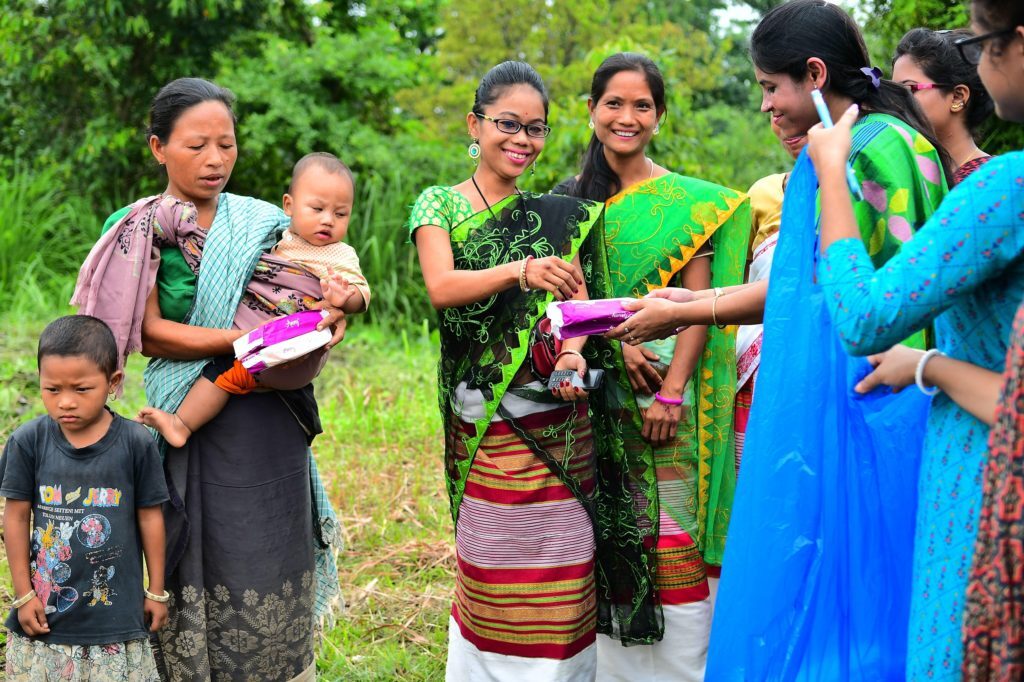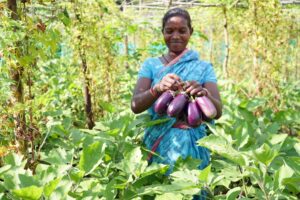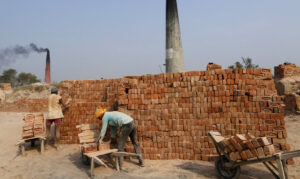Sanitary Pads: As India Breaks Taboo, Environmental Crisis Mounts

FILE PHOTO: Health workers distribute free sanitary pads to women and girls in Tripura
In the throes of the first pandemic induced lockdown in Indian history, many started to reflect on how the human footprint on the environment can eventually come back to bite. It was during that time that Delhi-based Simran Monga and her family decided to play their part and go zero-waste.
The Mongas measured their monthly domestic trash of almost 60 kilograms, ordered a terracotta compost unit, and started phasing out non-compostable items from usage. But even after weeks of planning, one particular item proved to be a nut hard to crack – sanitary pads. “It’s a taboo subject, it’s a health requirement but let’s accept that it’s an environment polluter too,” said the 27-year-old graphic designer.
Simran is one among the 336 million menstruating people in India, out of which nearly 121 million use commercially produced disposable sanitary napkins, according to a study by WaterAid India and Menstrual Hygiene Alliance India. The study says that disposable sanitary pads may take over 500 years to decompose, posing a big environmental challenge.
What makes the problem more complex is that in developing countries like India, menstrual health is not only a big hygiene issue, but also a social taboo. While a society cannot compromise on the efforts to increase access to sanitary hygiene products in a country where women’s health is often neglected, the steadily growing menstrual waste pile is an equally acute environmental issue, said Delhi-based waste management expert Swati Singh Sambyal.
“Disposable sanitary napkins are a hazard because 70-90% of a sanitary pad is made of plastic.” One pad is equivalent to four plastic bags, she says, “so one can imagine the quantity of single use non-biodegradable plastic generated every month from sanitary napkins. It’s a strong enough issue to raise environmental concerns.”
GROWING USAGE AND MARKET
The latest government data show that adoption of sanitary pads among eligible women is growing steadily among the 15-24 age group. For example, in Bihar 58.8% of girls and women in this age group were using such products, recording an almost 90% growth in four years. In Andhra Pradesh, its usage has risen to 85.1% from 67.5% in 2015-16. A similar trend is observed in most Indian states.
In 2020, the Indian sanitary napkin market touched USD 521.5 million and is expected to reach USD 975.4 million by 2026, according to US-based market research firm Expert Market Research (EMR). “Sanitary pads are now widely available, but are we meeting this greater availability with appropriate waste management solutions that do not harm users and the environment?” said Arundati Muralidharan, policy manager at WaterAid India and author of their 2018 report on menstrual waste.
COMFORT AND PAIN POINTS
Initially, sanitary napkins were made of cotton and gauge. But to opt for a more cost-effective raw material, manufacturers turned to wood pulp, an absorbent material. Then came the plastic revolution and changed sanitary napkins’ composition, which is comfortable but not healthy, said Pooja Katkar, assistant professor at DKTE’s Textile and Engineering Institute in Maharashtra.
Now, the top permeable layer of the sanitary napkin is made of polypropylene or polyethylene. Inside fluffy pads the absorbent core is wood pulp, and in ultra-thin ones it is made of Super Absorbent Polymer (SAP), an absorbent material. And the bottom barrier layer is made of polyethylene, explained Swati V. Chavan, another assistant professor of textile chemistry at DKTE’s Textile and Engineering Institute.
These components might look innocuous, but essentially a majority of it is non-biodegradable, and bad for women’s health, according to Delhi-based gynaecologist Meenakshi Sahu. Plastic in sanitary pads “disturbs vaginal microflora balance and can cause health problems including urinary tract infection, rashes and genital tract infection,” Sahu said.
POLICY GAPS
While the waste pile is a practical and measurable problem, policies remain vague. India’s pollution watchdog Central Pollution Control Board (CPCB) mandated that soiled napkins as well as other sanitary products should be separated into biodegradable and non-biodegradable components. However, the BioMedical Waste Management Rules 2016 indicate that items contaminated with blood and body fluids, including cotton, dressings, soiled plaster casts, lines and bedding, are bio-medical waste and should be incinerated, autoclaved or microwaved to destroy pathogens, CPCB says.
However, environmental experts, social enterprises and studies argue that when these pads are burned in the open or in incinerators, they release toxic chemicals such as furans, a highly volatile chemical compound, and dioxins that are known carcinogens.
Sambyal pointed out that commercial napkin brands add to the problem by not disclosing the product composition on the package, but Richa Singh, chief executive officer (CEO) of sanitary napkin brand Niine said there is “no mandatory rule in India to mention the composition of their products on the packets”.
GREEN ALTERNATIVES OR GREEN WASH?
Amid growing apprehension about sanitary pads’ environmental impacts, several social enterprises are now offering alternatives – while some are biodegradable and compostable, others include reusable absorbent underwear, menstrual cups and reusable cloth pads, a modern and better-designed version of the traditional cloth.
A 2020 survey found that some 63% women surveyed recognised that sanitary pads are harmful for the environment and 80% of them expressed their willingness to shift to eco-friendly substitutes.
“Adoption of eco-friendly alternatives is a welcome move and we do see the shift happening across verticals of users,” said Jaydeep Mandal, founder and managing director of Aakar Innovations, a social enterprise that produces ‘compostable’ sanitary pads. “Besides awareness about menstrual hygiene, the change can be attributed largely to financial independence and most importantly, climate consciousness.”
But Richa Malik, founder of The Happy Turtle, a Delhi-based plastic footprint reduction consultancy firm said that compostable and biodegradable sanitary napkins are mostly green-washing. “All they do is replace fossil fuel-based plastic with bio-based plastic. So, instead of fossil fuel building blocks, they use plant material such as corn to make the polymer,” she explained.
“Once discarded, biodegradable plastic breaks down into micro bio-plastic and remains in the soil for an unknown lifetime. So far, there are no techniques for testing and extracting micro-bioplastics from soil,” Malik added.
While different stakeholders have varied viewpoints on products, they do agree on the environmental side-effects and emphasize the need for a robust waste management system. A point Unicef emphasises too.
“A waste management chain needs to be in place from on-point to endpoint. As cultural beliefs and stigma influence individual disposal, users must change their disposal behaviour and reduce environmental impact, pollution of sanitation systems, including water bodies in rural India.”





